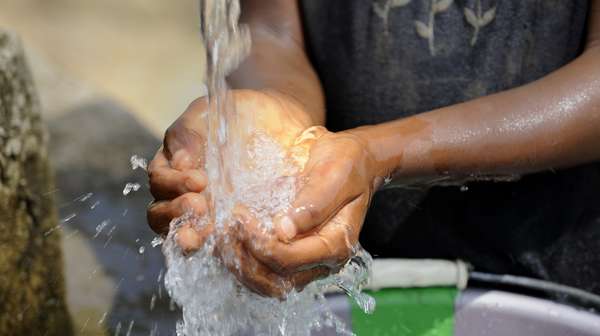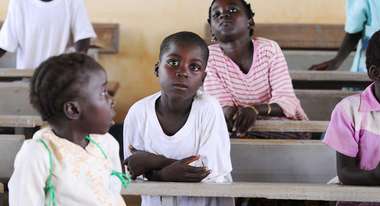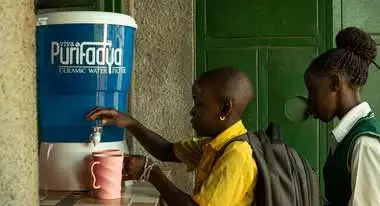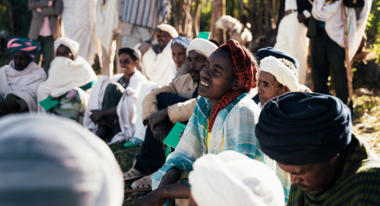Whether for food, irrigating fields, animal husbandry, or personal care, WASH is essential for health and development.
System strengthening: towards the sustainability of WASH
WHH Ethiopia and its partner HUNDEE are working to change the conventional way of water, sanitation and hygiene (WASH) interventions by adopting a systematic and holistic approach for sustainability.
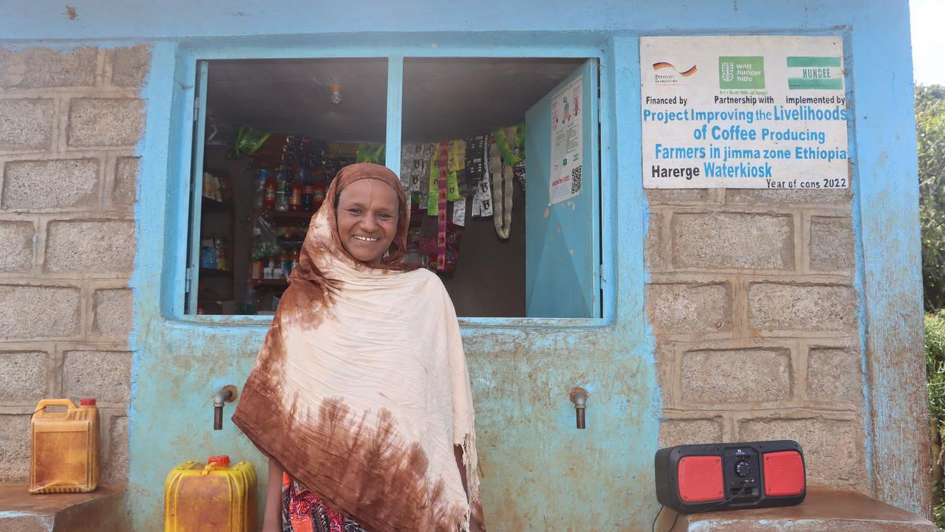
A 31-year-old mother of six, Zeyneb Abamecha is a water attendant at one of the water kiosks in Seka Chekorsa Wereda of Jimma Zone. Her kiosk is one of four in the kebele where WHH Ethiopia together with its local partner HUNDEE constructed a 13km long water pipe from the water source.
Like the other women and girls in the kebele, Zeyneb and her daughter used to walk 30 minutes each way to fetch water from the nearby river. "My 14-year-old daughter used to be late for school or sometimes missed classes because she was looking for water. My young children used to get all sorts of water-borne diseases and had to visit the nearby health posts repeatedly. They did not even get the right weight".
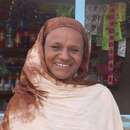
The income I get from this helps me to cover my household expenses
Zeyneb Abamecha Water Attendant of the water kiosk in Seka Chekorsa WeredaThis is now a thing of the past, as Zeyneb and the other women in the kebele now have clean water within walking distance. For Zeyneb, the water kiosk has not only provided much-needed clean water, but also an additional source of income. "As a water attendant, I sell various items to people who come to the kiosk to buy water, as the kiosk also serves as a shop for other items. Since we don't have electricity in Kebelle, I also use the kiosk's solar system to charge my customers' mobile phones for a small amount of money. The income I get from this helps me to cover my household expenses".
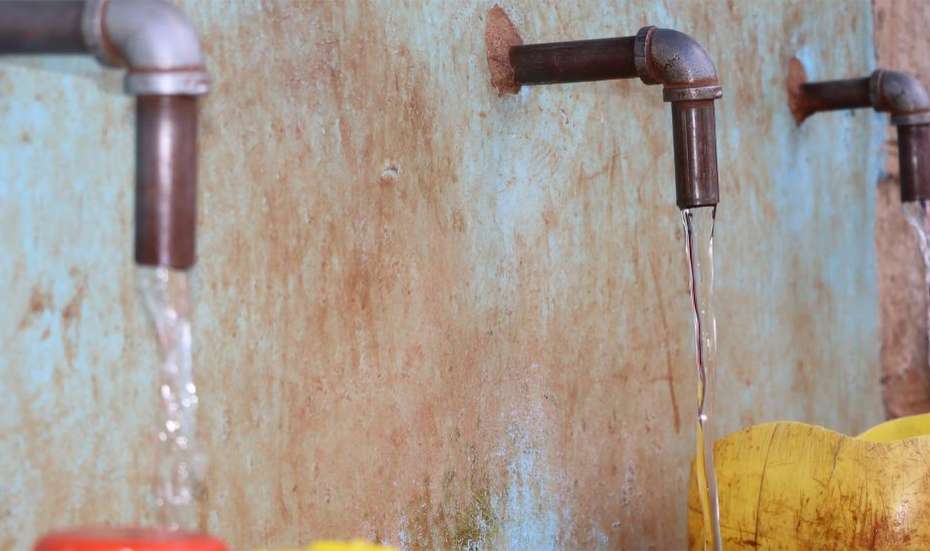
Villagers come to the water kiosk not only to get their daily supply of water, Zeyneb adds. "While waiting for their water buckets to be filled in turn, they also listen to a pre-recorded hygiene promotion message from the mp3 player in the kiosk." Hygiene posters in the local language are displayed in the kiosk window to promote personal hygiene messages.
When villagers buy water from the kiosk, they pay 25 cents per jerrycan (bucket). This money is saved in the bank and used by the WASH committee when the water system needs maintenance.
Now that they have a clean water source in their neighborhood, the women and girls have been relieved of a huge burden: "We are relieved of having to walk long distances carrying jerry cans on our backs. Our children no longer get sick from drinking unclean water. Now our lives are easier because we have more time to take care of our little ones and do other household chores," Zeyneb concludes.
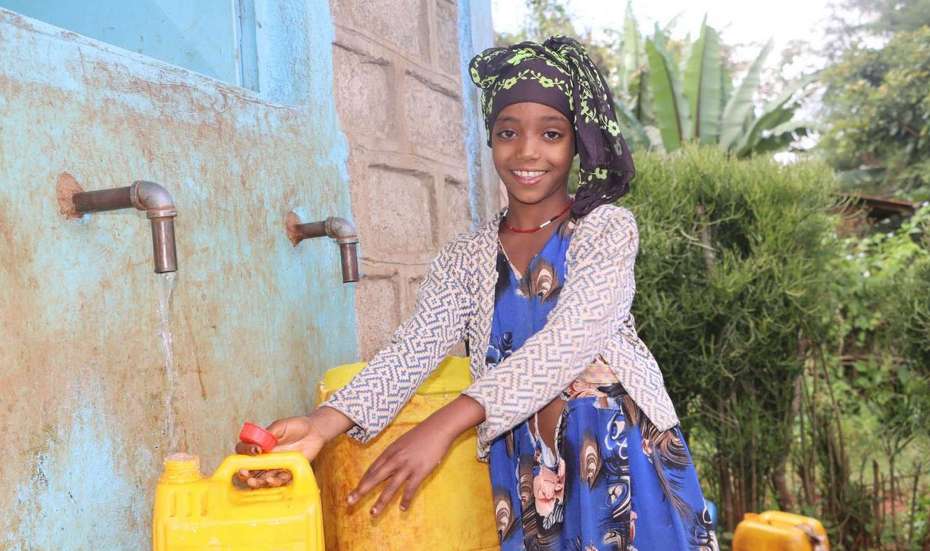
No more missing classes
A few kilometers away is another water kiosk. Nejiba Abedella, a 10-year-old girl who lives nearby, also used to fetch dirty water from a distant river. This caused her to miss school and risk being expelled for being late. "I used to miss so many classes because most mornings it was too late to go to class after returning from the river," she says.
Having access to clean water within walking distance improves her health, education and happiness. Her story exemplifies how clean water empowers women and girls in her community.
The role of Water Users’ Committee in the eye of a woman-chairperson
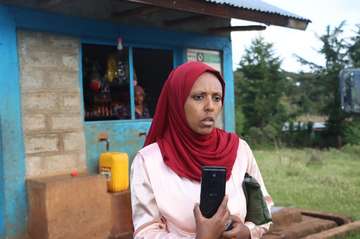
Jemilla Yasmin, 29, is a health extension worker by profession and the first and only female Water User Association (WUA) chairperson in her community. Jemila advocates for greater representation of women in WUAs, citing the challenges of water accessibility and the associated burdens that disproportionately affect women.
"I am the only woman on the five-member water user committee. We monitor the functioning of the water kiosks in three kebeles. In the beginning, it was even difficult to get my point across at the monthly committee meetings as it was strange for the committee members to take direction from a female committee leader. But now things are getting better. I am discussing with the committee members about having more female members, as there needs to be at least a 50/50 split. Hopefully the next round of elections will bring more women," says Jemilla.
As head of the committee, Jemilla makes sure that the water is flowing steadily, that the money is properly collected by the water attendants and that the money collected is saved in the bank. Whenever maintenance is needed, she contacts the right people and pays for it. The caretakers, who have also been trained as part of the project intervention, then come and carry out the necessary maintenance as required.
Sustainability: strengthening the WASH system
It is a regular occurrence that once communities have access to WASH facilities, sustainability issues follow. It is not uncommon for water systems to fail irregularly and completely due to issues of lack of ownership, lack of follow-up, and lack of strong WASH Cos and water user associations. Lack of trained maintenance staff and unavailability of basic spare parts also contribute to this reality. On the government side, a lack of initiative to take the lead in strengthening the system and poor coordination between different agencies are also contributing factors.
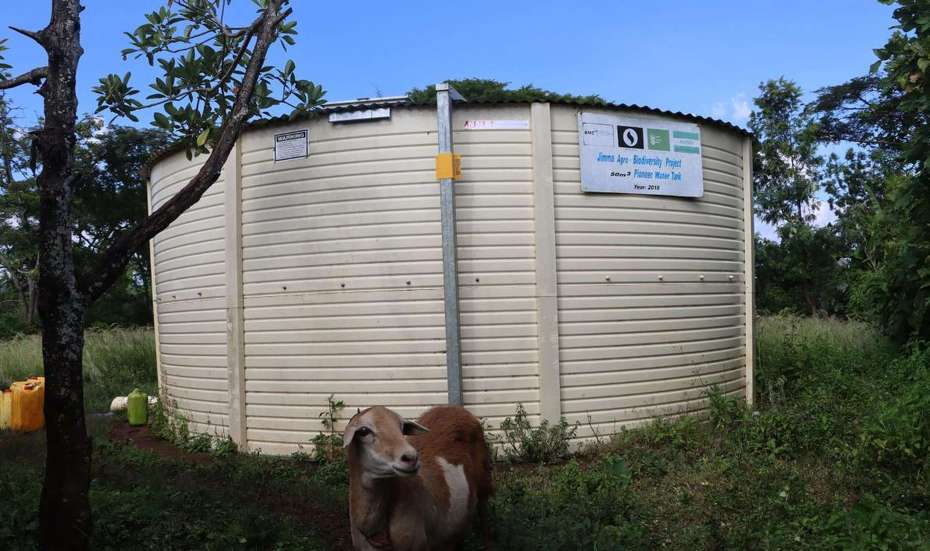
WHH Ethiopia and its partner HUNDEE are working to change the conventional way of WASH implementation by adopting a systematic and holistic approach for sustainability in Seka Chekors, Manna and Gomma Woredas of Jimma Zone, Oromia Region. In Seka Chekors Woreda alone, WHH Ethiopia, together with its partner HUNDEE, has provided access to clean water for more than 10,000 people through a single water supply system.
To ensure the sustainability of the water system, WHH is implementing a woreda-wide WASH system strengthening approach. This approach aims to create a system for all relevant stakeholders - government, NGOs, water user associations, the private sector and the community at large - to coordinate and work towards the SDGs by providing training related to working together for a common goal to all stakeholders involved.
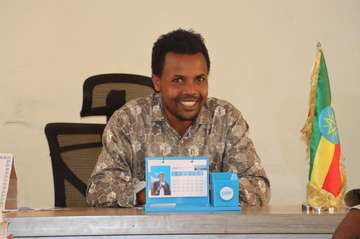
Dechasa Ambesu, Seka Chekorsa Woreda Water Office Delegate and Focal Person, explains: "All the government offices used to work separately and carry out the duties of their respective offices, but we learn during the training that without cooperation and coordination we cannot achieve our goal. For example, the health department used to focus only on sanitation and our department only on water supply and access, but the two departments cannot achieve their goal independently. We have now created platforms for discussion, joint planning and implementation. As a result, the number of non-functioning water systems will eventually decrease significantly," he adds.
The woreda is also bringing the private sector into the picture. "Whenever there is a maintenance problem, the first thing the water user associations usually mention is the lack of spare parts in the local market. Now we are in discussion with the private sector to get involved in this area. For example, we have already started working with a youth group that has started producing building blocks (slabs) for the latrines we have built for the community," says Dechasa.
About the project
The WASH System Strengthening approach aims to improve the sustainability of WASH in the three woredas. Cost recovery and the coordination and implementation of post-construction support by WASH service authorities and service providers are consistently rated as highly critical.
Other critical factors include community management capacity, user satisfaction, motivation and willingness to pay, maintenance, availability of spare parts, ongoing training and support for sanitation and hygiene education activities, and environmental factors.





